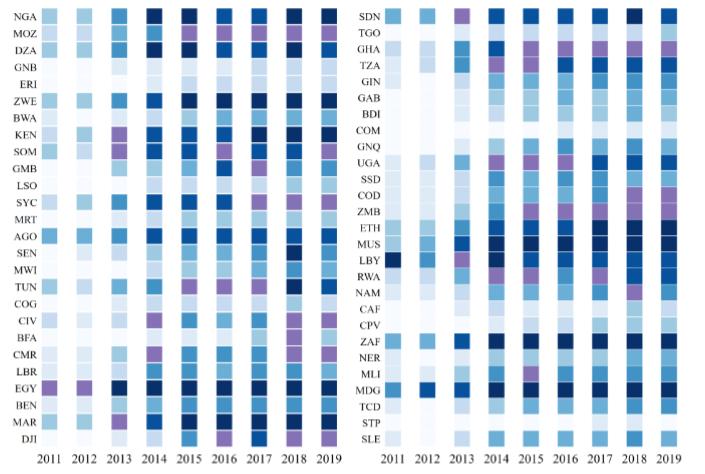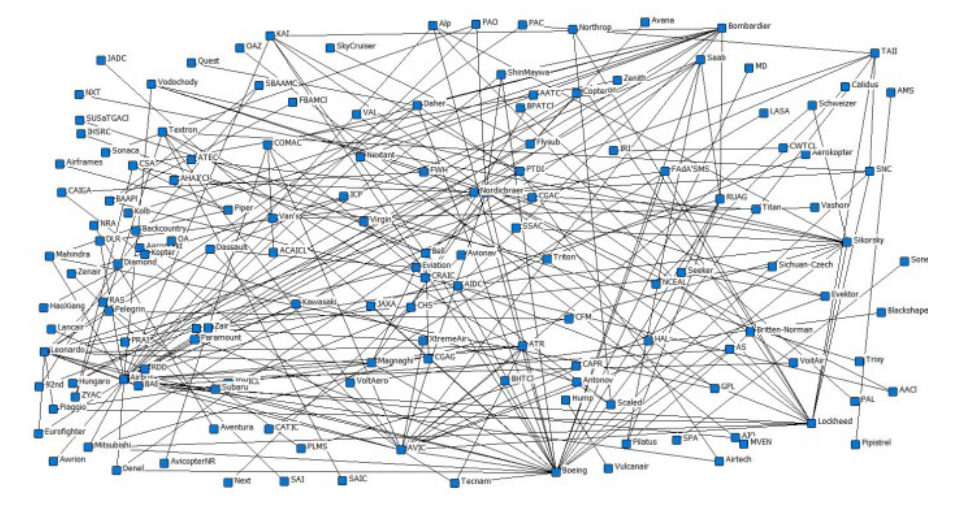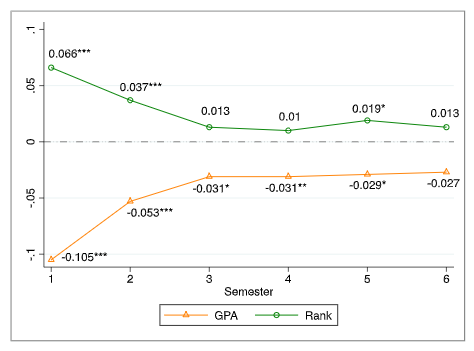Does digital village construction contribute to improving food security?
Abstract
The issue of food security has become a global challenge, and it is therefore crucial to seek measures to ensure food security. As an emerging economic model, the digital economy is regarded as the most effective tool for the modernization of agricultural development. As a large food-producing country, China faces serious problems of agricultural non-point source pollution and food loss and waste. The purpose of this study is to explore the impact of digital village construction on food security. We measure the level of digital village construction and food security by entropy method and use the spatial Durbin model to analyze them. In this paper, we found that digital village construction facilitates food security not only in the region but also in neighboring regions. In addition, we found that the promotion effect is significant in main grain producing regions, while the opposite result is found in non-main grain producing regions. We hold that the application of the digital economy in the countryside has played an obvious role in promoting food security in main grain producing provinces, and provides important experimental evidence for reference to ensure food security in the future.
Cite This Paper
Huang, M., & Bai, Y. (2024). Does digital village construction contribute to improving food security?. Review of Economic Assessment, 3(1), 27. doi:10.58567/rea03010005
Huang, M.; Bai, Y. Does digital village construction contribute to improving food security?. Review of Economic Assessment, 2024, 3, 27. doi:10.58567/rea03010005
Huang M, Bai Y. Does digital village construction contribute to improving food security?. Review of Economic Assessment; 2024, 3(1):27. doi:10.58567/rea03010005
Huang, Minmin; Bai, Yanhu 2024. "Does digital village construction contribute to improving food security?" Review of Economic Assessment 3, no.1:27. doi:10.58567/rea03010005
Funding
Share and Cite
Article Metrics
References
- Ahmed, S., ten Broek, N. (2017). Blockchain could boost food security. Nature 550(7674), 43-43. https://doi.org/10.1038/550043e
- Asche, F., Bellemare, M.F., Roheim, C., Smith, M.D., Tveteras, S. (2015). Fair Enough? Food Security and the International Trade of Seafood. World Development 67, 151-160. https://doi.org/10.1016/j.worlddev.2014.10.013
- Bai, D., Hu, J., Irfan, M., Hu, M. (2023). Unleashing the impact of ecological civilization pilot policies on green technology innovation: Evidence from a novel SC-DID model. Energy Economics 125, 106813. https://doi.org/10.1016/j.eneco.2023.106813
- Bai, Y., Yang, Z., Huang, M., Hu, M., Chen, S., Luo, J. (2023). How can blockchain technology promote food safety in agricultural market?—an evolutionary game analysis. Environmental Science and Pollution Research 30(40), 93179-93198. https://doi.org/10.1007/s11356-023-28780-7
- Benyam, A., Soma, T., Fraser, E. (2021). Digital agricultural technologies for food loss and waste prevention and reduction: Global trends, adoption opportunities and barriers. Journal of Cleaner Production 323, 129099. https://doi.org/10.1016/j.jclepro.2021.129099
- Cai, Z., Li, S.S., Cheng, D. (2023). Has Digital Village Construction Improved Rural Family Resilience in China? Evidence Based on China Household Finance Survey. Sustainability 15(11). https://doi.org/10.3390/su15118704
- Cao, L.L., Niu, H.W., Wang, Y.F. (2022). Utility analysis of digital villages to empower balanced urban-rural development based on the three-stage DEA-Malmquist model. Plos One 17(8). https://doi.org/10.1371/journal.pone.0270952
- Chen, W., Wang, Q.Z., Zhou, H. (2022). Digital Rural Construction and Farmers' Income Growth: Theoretical Mechanism and Micro Experience Based on Data from China. Sustainability 14(18). https://doi.org/10.3390/su141811679
- Chen, Y., Hu, J., Chen, H., Chu, Z., Hu, M. (2023). Public attention, big data technology, and green innovation efficiency: empirical analysis based on spatial metrology. Journal of Environmental Planning and Management 1-27. https://doi.org/10.1080/09640568.2023.2298249
- Clapp, J., Moseley, W.G., Burlingame, B., Termine, P. (2022). Viewpoint: The case for a six-dimensional food security framework. Food Policy 106, 102164. https://doi.org/10.1016/j.foodpol.2021.102164
- Devereux, S., Béné, C., Hoddinott, J. (2020). Conceptualising COVID-19's impacts on household food security. Food Security 12(4), 769-772. https://doi.org/10.1007/s12571-020-01085-0
- Ding, J., Qiao, P., Wang, J.X., Huang, H.Y. (2022). Impact of food safety supervision efficiency on preventing and controlling mass public crisis. Frontiers in Public Health 10. https://doi.org/10.3389/fpubh.2022.1052273
- Fan, J.C., Lu, X.J., Gu, S.H., Guo, X.Y. (2020). Improving nutrient and water use efficiencies using water-drip irrigation and fertilization technology in Northeast China. Agricultural Water Management 241, 106352. https://doi.org/10.1016/j.agwat.2020.106352
- Feng, H.H., Wang, X., Duan, Y.Q., Zhang, J., Zhang, X.S. (2020). Applying blockchain technology to improve agri-food traceability: A review of development methods, benefits and challenges. Journal of Cleaner Production 260, 121031. https://doi.org/10.1016/j.jclepro.2020.121031
- Gathala, M.K., Laing, A.M., Tiwari, T.P., Timsina, J., Islam, M.S., Chowdhury, A.K., Chattopadhyay, C., Singh, A.K., Bhatt, B.P., Shrestha, R., Barma, N.C.D., Rana, D.S., Jackson, T.M., Gerard, B. (2020). Enabling smallholder farmers to sustainably improve their food, energy and water nexus while achieving environmental and economic benefits. Renewable & Sustainable Energy Reviews 120, 109645. https://doi.org/10.1016/j.rser.2019.109645
- Guo, B.N., Wang, Y., Zhang, H., Liang, C.Y., Feng, Y., Hu, F. (2023). Impact of the digital economy on high-quality urban economic development: Evidence from Chinese cities. Economic Modelling 120, 106194. https://doi.org/10.1016/j.econmod.2023.106194
- Guo, H.D., Liu, Y.H., Shi, X.J., Chen, K.Z. (2021). The role of e-commerce in the urban food system under COVID-19: lessons from China. China Agricultural Economic Review 13(2), 436-455. https://doi.org/10.1108/CAER-06-2020-0146
- He, C.Y., Liu, Z.F., Xu, M., Ma, Q., Dou, Y.Y. (2017). Urban expansion brought stress to food security in China: Evidence from decreased cropland net primary productivity. Science of the Total Environment 576, 660-670. https://doi.org/10.1016/j.scitotenv.2016.10.107
- Holden, S.T., Ghebru, H. (2016). Land tenure reforms, tenure security and food security in poor agrarian economies: Causal linkages and research gaps. Global Food Security-Agriculture Policy Economics and Environment 10, 21-28. https://doi.org/10.1016/j.gfs.2016.07.002
- Howden, S.M., Soussana, J.F., Tubiello, F.N., Chhetri, N., Dunlop, M., Meinke, H. (2007). Adapting agriculture to climate change. Proceedings of the National Academy of Sciences of the United States of America 104(50), 19691-19696. https://doi.org/10.1073/pnas.0701890104
- Hu, J. (2023). Synergistic effect of pollution reduction and carbon emission mitigation in the digital economy. Journal of Environmental Management 337, 117755. https://doi.org/10.1016/j.jenvman.2023.117755
- Hu, J., Hu, M.J., Zhang, H. (2023a). Has the construction of ecological civilization promoted green technology innovation? Environmental Technology & Innovation 29, 102960. https://doi.org/10.1016/j.eti.2022.102960
- Hu, J., Zhang, H., Irfan, M. (2023b). How does digital infrastructure construction affect low-carbon development? A multidimensional interpretation of evidence from China. Journal of Cleaner Production 396, 136467. https://doi.org/10.1016/j.jclepro.2023.136467
- Hu, M., Sima, Z., Chen, S., Huang, M. (2023). Does green finance promote low-carbon economic transition? Journal of Cleaner Production 427, 139231. https://doi.org/10.1016/j.jclepro.2023.139231
- Huang, J.K., Yang, G.L. (2017). Understanding recent challenges and new food policy in China. Global Food Security-Agriculture Policy Economics and Environment 12, 119-126. https://doi.org/10.1016/j.gfs.2016.10.002
- Jiang, S., Zhou, J., Qiu, S. (2022). Digital Agriculture and Urbanization: Mechanism and Empirical Research. Technological Forecasting and Social Change 180, 121724. https://doi.org/10.1016/j.techfore.2022.121724
- Jones, A.D., Ngure, F.M., Pelto, G., Young, S.L. (2013). What are we assessing when we measure food security? A compendium and review of current metrics. Advances in nutrition 4(5), 481-505. https://doi.org/10.3945/an.113.004119
- Kamble, S.S., Gunasekaran, A., Gawankar, S.A. (2020). Achieving sustainable performance in a data-driven agriculture supply chain: A review for research and applications. International Journal of Production Economics 219, 179-194. https://doi.org/10.1016/j.ijpe.2019.05.022
- Kang, S.Z., Hao, X.M., Du, T.S., Tong, L., Su, X.L., Lu, H.N., Li, X.L., Huo, Z.L., Li, S.E., Ding, R.S. (2017). Improving agricultural water productivity to ensure food security in China under changing environment: From research to practice. Agricultural Water Management 179, 5-17. https://doi.org/10.1016/j.agwat.2016.05.007
- Kerr, R.B., Madsen, S., Stuber, M., Liebert, J., Enloe, S., Borghino, N., Parros, P., Mutyambai, D.M., Prudhon, M., Wezel, A. (2021). Can agroecology improve food security and nutrition? A review. Global Food Security 29, 100540. https://doi.org/10.1016/j.gfs.2021.100540
- Klerkx, L., Jakku, E., Labarthe, P. (2019). A review of social science on digital agriculture, smart farming and agriculture 4.0: New contributions and a future research agenda. Njas-Wageningen Journal of Life Sciences 90-91:1, 1-16. https://doi.org/10.1016/j.njas.2019.100315
- Lee, C.C., Zeng, M.L., Luo, K. (2023). Food security and digital economy in China: A pathway towards sustainable development. Economic Analysis and Policy 78, 1106-1125. https://doi.org/10.1016/j.eap.2023.05.003
- Leong, C., Pan, S.L., Newell, S., Cui, L.L. (2016). The Emergence of Self-Organizing E-Commerce Ecosystems in Remote Villages of China: A Tale of Digital Empowerment for Rural Development. Mis Quarterly 40(2), 475-484. https://doi.org/10.25300/MISQ/2016/40.2.11
- Li, H.L., Yang, Z.Y., Jin, C.H., Wang, J.X. (2023). How an industrial internet platform empowers the digital transformation of SMEs: theoretical mechanism and business model. Journal of Knowledge Management 27(1), 105-120. https://doi.org/10.1108/JKM-09-2022-0757
- Li, X.J., Chandel, R.B.S., Xia, X.L. (2022). Analysis on Regional Differences and Spatial Convergence of Digital Village Development Level: Theory and Evidence from China. Agriculture-Basel 12(2). https://doi.org/10.3390/agriculture12020164
- Lin, Y.M., Li, C.H. (2023). Does rural e-commerce agglomeration help expand family farms' size? Evidence from Taobao villages in China's Yangtze River Delta. Electronic Commerce Research 23, 1731-1752. https://doi.org/10.1007/s10660-023-09735-z
- Lioutas, E.D., Charatsari, C., De Rosa, M. (2021). Digitalization of agriculture: A way to solve the food problem or a trolley dilemma? Technology in Society 67,101744. https://doi.org/10.1016/j.techsoc.2021.101744
- Liu, Y.S., Zhou, Y. (2021). Reflections on China's food security and land use policy under rapid urbanization. Land Use Policy 109, 105699. https://doi.org/10.1016/j.landusepol.2021.105699
- Luo, J., Hu, M., Huang, M., Bai, Y. (2023a). How does innovation consortium promote low-carbon agricultural technology innovation: An evolutionary game analysis. Journal of Cleaner Production 384, 135564. https://doi.org/10.1016/j.jclepro.2022.135564
- Luo, J., Huang, M., Hu, M., Bai, Y. (2023b). How does agricultural production agglomeration affect green total factor productivity?: empirical evidence from China. Environmental Science and Pollution Research 30, 1-15. https://doi.org/10.1007/s11356-023-27106-x
- Mei, Y., Miao, J.Y., Lu, Y.H. (2022). Digital Villages Construction Accelerates High-Quality Economic Development in Rural China through Promoting Digital Entrepreneurship. Sustainability 14(21). https://doi.org/10.3390/su142114224
- Nosratabadi, S., Khazami, N., Ben Abdallah, M., Lackner, Z., Band, S.S., Mosavi, A., Mako, C. (2020). Social Capital Contributions to Food Security: A Comprehensive Literature Review. Foods 9(11). https://doi.org/10.3390/foods9111650
- O'Hara, S., Toussaint, E.C. (2021). Food access in crisis: Food security and COVID-19. Ecological Economics 180, 106859. https://doi.org/10.1016/j.ecolecon.2020.106859
- Pinstrup-Andersen, P. (2009). Food security: definition and measurement. Food Security 1(1), 5-7. https://doi.org/10.1007/s12571-008-0002-y
- Qi, X.X., Liu, L.M., Liu, Y.B., Yao, L. (2013). Risk assessment for sustainable food security in China according to integrated food security-taking Dongting Lake area for example. Environmental Monitoring and Assessment 185(6), 4855-4867. https://doi.org/10.1007/s10661-012-2908-2
- Rotz, S., Duncan, E., Small, M., Botschner, J., Dara, R., Mosby, I., Reed, M., Fraser, E.D.G. (2019). The Politics of Digital Agricultural Technologies: A Preliminary Review. Sociologia Ruralis 59(2), 203-229. https://doi.org/10.1111/soru.12233
- Schaffner, M., Bader, H.-P., Scheidegger, R. (2011). Modeling non-point source pollution from rice farming in the Thachin River Basin. Environment Development and Sustainability 13(2), 403-422. https://doi.org/10.1007/s10668-010-9268-2
- Schmidhuber, J., Tubiello, F.N. (2007). Global food security under climate change. Proceedings of the National Academy of Sciences of the United States of America 104(50), 19703-19708. https://doi.org/10.1073/pnas.0701976104
- Shen, Z.Y., Wang, S.K., Boussemart, J.P., Hao, Y. (2022). Digital transition and green growth in Chinese agriculture. Technological Forecasting and Social Change 181, 121742. https://doi.org/10.1016/j.techfore.2022.121742
- Tan, L., Yang, Z., Irfan, M., Ding, C. J., Hu, M., Hu, J. (2023). Toward low‐carbon sustainable development: Exploring the impact of digital economy development and industrial restructuring. Business Strategy and the Environment 33(3), 2159–2172. https://doi.org/10.1002/bse.3584
- Tang, Y., Chen, M.H. (2022). The Impact Mechanism and Spillover Effect of Digital Rural Construction on the Efficiency of Green Transformation for Cultivated Land Use in China. International Journal of Environmental Research and Public Health 19(23). https://doi.org/10.3390/ijerph192316159
- Tilman, D., Balzer, C., Hill, J., Befort, B.L. (2011). Global food demand and the sustainable intensification of agriculture. Proceedings of the National Academy of Sciences of the United States of America 108(50), 20260-20264. https://doi.org/10.1073/pnas.1116437108
- Tobler, W.R. (1970). A computer movie simulating urban growth in the Detroit region. Economic geography 46(sup1), 234-240. https://doi.org/10.2307/143141
- Tu, C., Chen, Z., Peng, Z., Habib, Y. (2023). The Efficiency of Rural Public Finance Inputs in Promoting Rural Revitalization: Empirical Analysis Based on Henan Province, China. Review of Economic Assessment 2(1), 73-86. https://doi.org/10.58567/rea02010005
- Upton, J.B., Cisse, J.D., Barrett, C.B. (2016). Food security as resilience: reconciling definition and measurement. Agricultural Economics 47, 135-147. https://doi.org/10.1111/agec.12305
- van Dijk, M., Morley, T., Rau, M.L., Saghai, Y. (2021). A meta-analysis of projected global food demand and population at risk of hunger for the period 2010-2050. Nature Food 2(7), 494-501. https://doi.org/10.1038/s43016-021-00322-9
- Viciunaite, V. (2023). Alternative food networks on digital platforms: Consumer preferences for platform versus local food attributes. Journal of Rural Studies 100, 103017. https://doi.org/10.1016/j.jrurstud.2023.103017
- Wang, H., Tang, Y.T. (2023). Spatiotemporal Distribution and Influencing Factors of Coupling Coordination between Digital Village and Green and High-Quality Agricultural Development-Evidence from China. Sustainability 15(10). https://doi.org/10.3390/su15108079
- Wang, J., Liu, C., Cai, Z.J. (2022). Digital literacy and subjective happiness of low-income groups: Evidence from rural China. Frontiers in Psychology 13. https://doi.org/10.3389/fpsyg.2022.1045187
- West, P.C., Gerber, J.S., Engstrom, P.M., Mueller, N.D., Brauman, K.A., Carlson, K.M., Cassidy, E.S., Johnston, M., MacDonald, G.K., Ray, D.K., Siebert, S. (2014). Leverage points for improving global food security and the environment. Science 345(6194), 325-328. https://doi.org/10.1126/science.1246067
- Winkler, K., Fuchs, R., Rounsevell, M., Herold, M. (2021). Global land use changes are four times greater than previously estimated. Nature Communications 12(1). https://doi.org/10.1038/s41467-021-22702-2
- Xi, X., Wei, S.B., Lin, K.L., Zhou, H.T., Wang, K., Zhou, H.Y., Li, Z., Nan, N., Qiu, L.P., Hu, F., Tsai, F.S., Chen, D.X. (2021). Digital Technology, Knowledge Level, and Food Safety Governance: Implications for National Healthcare System. Frontiers in Public Health 9. https://doi.org/10.3389/fpubh.2021.753950
- Xiang, T., Malik, T.H., Nielsen, K. (2020). The impact of population pressure on global fertiliser use intensity, 1970-2011: An analysis of policy-induced mediation. Technological Forecasting and Social Change 152, 119895. https://doi.org/10.1016/j.techfore.2019.119895
- Yang, H., Wang, X.X., Bin, P. (2022). Agriculture carbon-emission reduction and changing factors behind agricultural eco-efficiency growth in China. Journal of Cleaner Production 334, 130193. https://doi.org/10.1016/j.jclepro.2021.130193
- Zhang, Y., Feng, M., Fang, Z., Yi, F., Liu, Z. (2023). Impact of Digital Village Construction on Agricultural Carbon Emissions: Evidence from Mainland China. International journal of environmental research and public health 20(5). https://doi.org/10.3390/ijerph20054189
- Zhang, Z. (2022). Research on the Impact of Digital Finance on China's Urban-Rural Income Gap. Review of Economic Assessment 1(1), 63-75. https://doi.org/10.58567/rea01010005
- Zhao, W., Liang, Z.Y., Li, B.R. (2022). Realizing a Rural Sustainable Development through a Digital Village Construction: Experiences from China. Sustainability 14(21). https://doi.org/10.3390/su142114199
- Zhou, J., Yang, F.F., Lin, G., Xie, X.R. (2023). WeChat business and place identity construction in rural China: A case study of Beiqishui village, Zhouzhi county. Technology in Society 73, 102239. https://doi.org/10.1016/j.techsoc.2023.102239
- Zhu, H., Chen, S., Irfan, M., Hu, M., Hu, J. (2023). Exploring the role of the belt and road initiative in promoting sustainable and inclusive development. Sustainable Development 32(1), 712-723. https://doi.org/10.1002/sd.2705
- Zhu, T., Zhang, X., Liu, X. (2022). Can University Scientific Research Activities Promote High-Quality Economic Development? Empirical evidence from provincial panel data. Review of Economic Assessment, 1(1), 34-50. https://doi.org/10.58567/rea01010003


